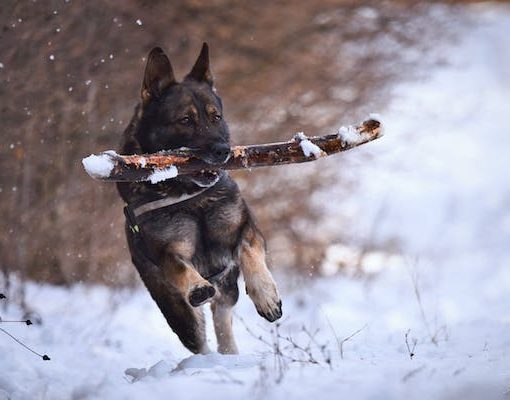Many pet owners wonder how long a German Shepherd can go without eating. This article provides crucial information on the dietary needs of German Shepherds, addressing the question of their food supply.
It emphasizes consulting a veterinarian for any concerns about their diet. The guide covers factors like age, health, and activity level, helping pet owners understand the best care for their dog’s health and well-being.
Factors That Affects How Long A German Shepherd Go Without Eating
The duration a German Shepherd can go without food is not a universal solution, as each dog has varying dietary needs.
Factors like stress, illness, and weather can affect appetite. To ensure a healthy and happy life, it’s crucial to rule out underlying health issues and focus on solutions that address the dog’s individual needs.
- Age
- Size
- Activity level
- Health.
Age
Puppies require more calories and nutrients than adult dogs for growth and development, while senior dogs require less to maintain their health.
Size
A German Shepherd’s size can also affect their dietary needs. Larger dogs typically need more calories than smaller dogs to maintain their weight.
Activity level
Active German Shepherds require more calories than less active dogs, and working and sporting dogs need even more calories than the average active dog.
Health
Dogs with certain health conditions may need a special diet to meet their nutritional needs. For example, dogs with kidney disease may need a low-protein diet.
Other factors: In addition to the factors listed above, there are other factors that can affect a German Shepherd’s diet, such as pregnancy, lactation, and allergies.
Potential Risks Involved When Your Dog Stays Long Without Food
When it comes to a dog going without food, there are a few potential risks to be aware of. These include:
- Dehydration
- Hypoglycemia
- Malnutrition
- Weight loss
Dehydration
Lack of food in dogs can lead to dehydration, causing various health issues.
Hypoglycemia
Hypoglycemia, a condition where a dog’s blood sugar levels drop too low, can lead to symptoms such as weakness, disorientation, and seizures.
Malnutrition
Malnutrition in dogs can lead to health issues such as weakened immune systems, poor coat condition, and stunted growth.
Weight loss
Not eating enough can cause a dog to lose weight, which can lead to a host of other health problems.
If your dog is not eating for over 24 hours, it’s crucial to consult a veterinarian to identify the cause and devise a plan to regain appetite.
In some cases, a lack of appetite may indicate a more severe health issue, so it’s advisable to be cautious and seek professional help if you’re concerned about your dog’s appetite.
Tips on How To Encourage Your German Shepherds to Eat
To encourage your healthy German Shepherd to eat and ensure they receive all necessary nutrients, you can try introducing them to new foods and providing them with a variety of nutritious treats:
- Switching up their food
- Trying hand-feeding
- Keep their food bowl clean
- Feed them at regular times
- Monitor their weight
- Consider adding supplements
- Access to clean water
- Offer quality dog food
- Avoid treats
Switching up their food
Sometimes a dog will simply get bored with their usual food. Try offering a different brand or flavor of food to see if that sparks their interest.
Trying hand-feeding
When fed by hand, certain dogs will consume food more easily. Additionally, it may strengthen your relationship with your dog.
Keep their food bowl clean
Dogs may become picky eaters if their food bowl is unclean. Ensure that their bowl is kept clean and clear of dirt, dust, and debris by giving it regular washings.
Feed them at regular times
Sticking to a regular feeding schedule can encourage your dog to eat more, as they appreciate routine and know when their next meal is.
Monitor their weight
Regular weigh-ins are crucial for monitoring your dog’s weight, ensuring they are not losing or gaining excessively, as a healthy weight is vital for their overall health and well-being.
Consider adding supplements
If your dog is not getting enough nutrients, consider adding a supplement to their diet. Consult your veterinarian to determine the best options for your dog’s health.
Access to clean water
Ensure your dog has access to fresh, clean water at all times.
Offer quality dog food
Offering high-quality dog food that is appropriate for your dog’s life stage and activity level.
Avoid treats
Avoiding too many treats, as these can add extra calories to your dog’s diet.
A balanced diet and frequent exercise, such as walking, running, swimming, or fetching, will keep your German Shepherd happy and healthy and help prevent boredom and destructive behavior. It’s also essential to provide mental stimulation through activities like training, puzzle toys, and dog socializing.
To maintain the health and happiness of your German Shepherd, consider these feeding tips, but remember that each dog has unique needs and should consult a veterinarian for a tailored feeding plan.
Guidelines to Follow to Feed Your German Shepherd
Various factors influence a German Shepherd’s ability to survive without food, but some general guidelines can be followed.
A healthy adult German Shepherd should be fed two to three times daily, while puppies may need three to four times daily, and senior dogs may only need one or two daily feedings.
If you suspect your German Shepherd is not eating enough, consult your veterinarian to identify underlying health issues. Be aware of signs of malnutrition, such as lethargy, weight loss, and poor coat condition, and contact your veterinarian immediately if you notice any of these symptoms.
The duration a German Shepherd can go without food varies based on their individual needs. Consult a veterinarian if unsure about your dog’s dietary requirements, as they can help create a feeding plan that meets their specific nutritional requirements.
Related Post: Can German Shepherds Eat Bananas? A Vet’s Advice on Dog-Friendly Snacks
Frequently Asked Questions About How Long A German Shepherd Can Go Without Eating
How long can a Healthy Adult German Shepherd go Without Food?
A healthy adult German Shepherd can survive 24-48 hours without food, but this depends on the dog’s health and activity level. Some dogs can go longer without food, while others may need more frequent feeding.
How long can a Sick German Shepherd go Without Food?
If your German Shepherd is sick, it’s crucial to consult your veterinarian for the best feeding plan. Some dogs may require more frequent small meals or a special diet, while others may require a more frequent, smaller meal.
How can I Encourage my German Shepherd to Eat More?
To encourage your German Shepherd to eat more, consider feeding them smaller, more frequent meals, offering a variety of foods, adding warm water or chicken broth, trying different feeding locations or bowls, providing exercise, ensuring stress and anxiety, and getting a veterinarian check if they still struggle. Consult a veterinarian for specific diet or feeding plan advice.
What should I do if My German Shepherd is Refusing to Eat?
If your German Shepherd is refusing to eat, it’s crucial to take them to the veterinarian for a health check. In the meantime, try enticing them to eat by offering their favorite treat, hand-feeding, or adding warm water or chicken broth to their food.
How can I Prevent my German Shepherd from becoming Overweight?
Maintain a regular eating plan, restrict treats, make sure your German Shepherd gets enough exercise, and get them examined by a veterinarian to help keep them from gaining weight. For individualized guidance, speak with your veterinarian because each dog has different dietary requirements.
How Much Should I Feed My German Shepherd?
Feeding your German Shepherd depends on their age, activity level, and overall health. Follow the food packaging’s recommendations and consult your vet for specific recommendations. It’s better to err on the side. Monitor your dog’s weight and adjust intake as needed.
Conclusion
German Shepherds can survive up to 48 hours without food, but it’s not recommended. A balanced diet, exercise, love, and attention are essential for their happiness and health.
German Shepherd nutrition is unique, so consult a veterinarian for specific needs. Monitor their weight and consult a veterinarian if concerns arise.




